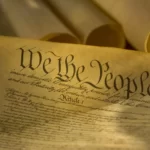The U.S. Constitution is often hailed as one of the most important legal documents in history. It lays the foundation for governance, justice, and the rights of citizens. But despite its significance, the Constitution is not immune to linguistic ambiguities—words and phrases that are open to multiple interpretations. These ambiguities have led to centuries of legal battles, Supreme Court rulings, and heated debates over what the Founders really meant.
This is why linguistics—the study of language, meaning, and interpretation—is essential in constitutional law. A single misplaced comma, an undefined term, or a vague phrase can shape the fate of millions. Here, we explore 10 linguistic ambiguities in the Constitution and why they matter.
1. “A Well Regulated Militia” (Second Amendment)
The Second Amendment states:
“A well regulated Militia, being necessary to the security of a free State, the right of the people to keep and bear Arms, shall not be infringed.”
The ambiguity arises from how we interpret “well regulated Militia.” Does this mean that only organized state militias (such as the National Guard) have the right to bear arms? Or does it mean that all individuals have a right to firearms? The placement of commas and the lack of clarity in 18th-century grammatical conventions make this one of the most hotly debated phrases in constitutional law.
2. “Necessary and Proper” (Article I, Section 8)
The Necessary and Proper Clause gives Congress the power to make laws that are “necessary and proper” for carrying out its enumerated powers. But what qualifies as “necessary”? Is it something absolutely essential, or just something helpful? Over the years, courts have expanded federal powers under this clause, but the lack of linguistic precision leaves room for continued debate.
3. “High Crimes and Misdemeanors” (Article II, Section 4)
The Constitution allows for the impeachment of the president for “Treason, Bribery, or other high Crimes and Misdemeanors.” But what exactly is a “high crime” or “misdemeanor”? The phrase was borrowed from British legal tradition, but it remains vague. Does it include non-criminal behavior, like abuse of power, or does it require an actual crime? This ambiguity has fueled every impeachment trial in U.S. history.
4. “Due Process” (Fifth & Fourteenth Amendments)
The Constitution guarantees that no one shall be deprived of “life, liberty, or property, without due process of law.” But what counts as “due process”? Does it mean strict legal formalities, or can it be interpreted more broadly to protect fundamental rights? Courts have used this phrase to justify everything from economic regulations to civil rights protections.
5. “The People” (Throughout the Constitution)
Who exactly are “the people” referred to in the Constitution? The phrase appears in multiple amendments (e.g., First, Second, Fourth, and Tenth), but it is never explicitly defined. Are “the people” all citizens, all residents, or just certain individuals? This ambiguity has been central to debates on immigration, voting rights, and gun control.
6. “Cruel and Unusual Punishment” (Eighth Amendment)
The Eighth Amendment prohibits “cruel and unusual punishment.” But what does that mean? In the 18th century, public executions were common, yet today, many would consider them cruel. Courts have struggled with whether practices like the death penalty, solitary confinement, or excessive bail violate this clause.
7. “Natural Born Citizen” (Article II, Section 1)
To be president, one must be a “natural born Citizen.” But what exactly does that mean? Does it include people born abroad to U.S. parents? What about people born in U.S. territories? Courts have never definitively ruled on this, leaving it open to political controversy (e.g., the eligibility debates over John McCain, Ted Cruz, and Kamala Harris).
8. “Advice and Consent” (Article II, Section 2)
The Senate has the power to give “advice and consent” on presidential appointments and treaties. But does “advice” mean the president must consult the Senate before making a nomination? Or does it only mean approval after the fact? This ambiguity has led to fierce battles over Supreme Court nominations and foreign policy decisions.
9. “Privileges or Immunities” (Fourteenth Amendment)
The Fourteenth Amendment guarantees that no state shall infringe on the “privileges or immunities” of U.S. citizens. But what are these privileges? Are they just the rights listed in the Constitution, or do they include broader rights, like free travel and business protections? This vague wording weakened the clause’s impact in later court rulings.
10. “Commerce” (Article I, Section 8)
Congress has the power to regulate “commerce among the several states.” But does “commerce” refer only to the buying and selling of goods, or does it include any economic activity? This debate has shaped laws on everything from civil rights (e.g., banning segregation in restaurants) to environmental regulations.
Why Linguistics Matters in Constitutional Law
Linguistic analysis plays a crucial role in interpreting the Constitution. Judges, lawyers, and scholars often turn to historical meanings, grammar, and context to resolve these ambiguities. Here’s why linguistic precision is vital:
- Clarity in Governance – Legal disputes often hinge on the interpretation of a single word or phrase. A clear Constitution reduces confusion and legal loopholes.
- Original Intent vs. Modern Understanding – Some believe we should interpret words based on the Founders’ intent, while others argue for evolving meanings. Linguistic study helps clarify both approaches.
- Fairness and Justice – Ambiguities can either protect or limit individual rights, depending on how they are interpreted.
- Precedent and Stability – Courts rely on linguistic analysis to ensure consistency in rulings, preventing drastic legal shifts.
- Public Understanding – Citizens should know their rights and responsibilities. Precise language helps avoid misinformation and legal uncertainty.
As long as language evolves and societies change, linguistic ambiguities will continue to shape constitutional law. Whether in courtrooms or classrooms, understanding these nuances is key to maintaining democracy and justice.
What are your thoughts on constitutional ambiguities? Let me know in the comments!





